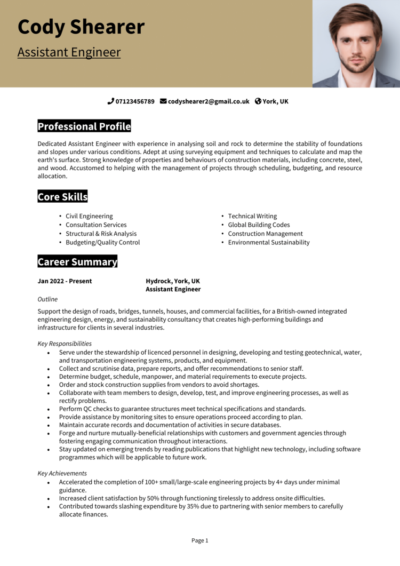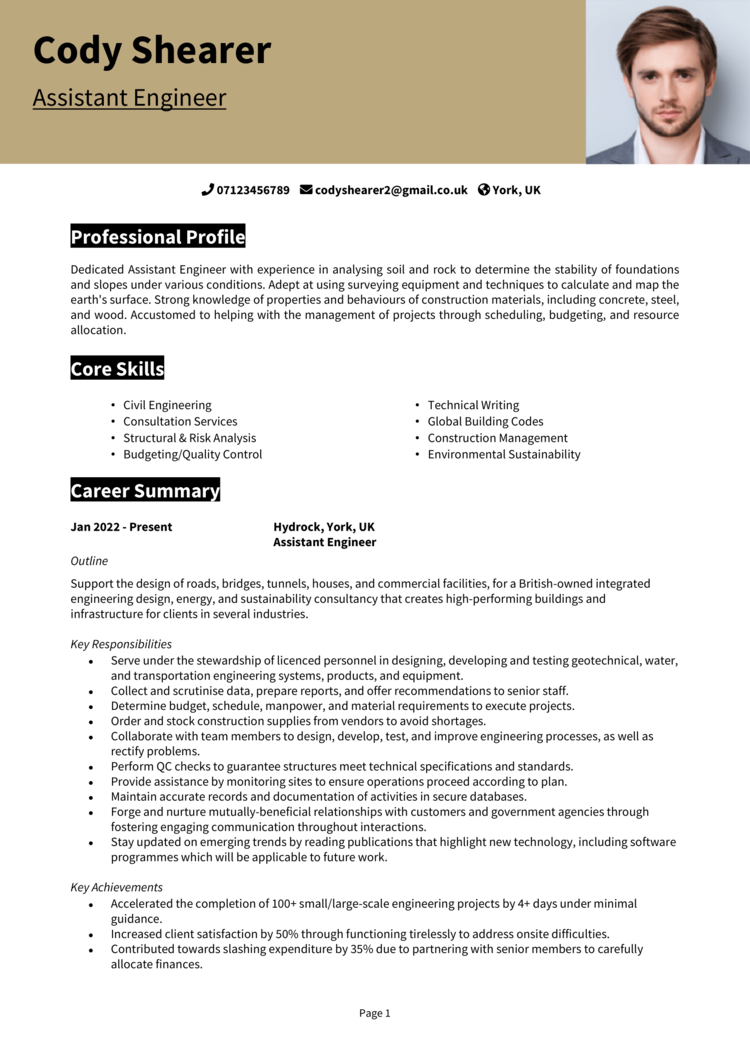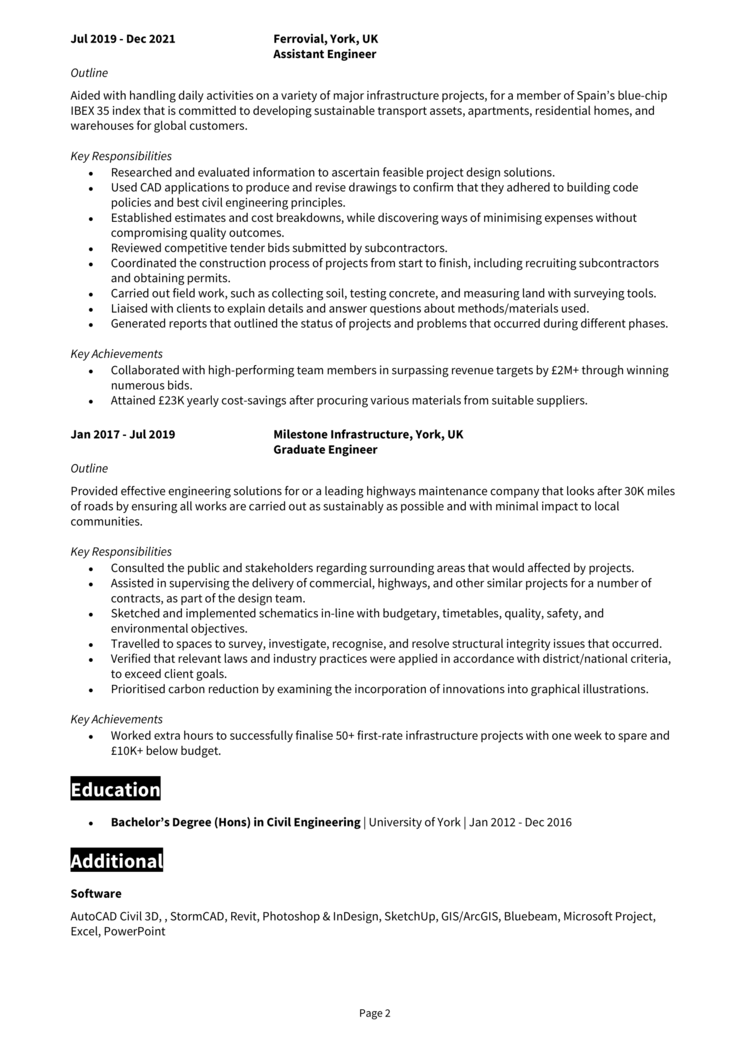Do you want to assist in planning and developing exciting engineering projects? Of course you do, it’s the perfect way to sharpen your skills and gain experience.
But to land the role, you need a CV that is designed to sell your relevant skills and qualifications.
We can help you to assemble the most relevant and impressive information, so you can construct your application. Simply use our step-by-step guide and assistant engineer CV example below.
|
Assistant Engineer CV example
Before you start writing your CV, take a look at the example Assistant Engineer CV above to give yourself a good idea of the style and format that works best in today’s job market.
Also, take note of the type of content that is included to impress recruiters, and how the most relevant information is made prominent, to ensure it gets noticed.


Assistant Engineer CV format and structure
Think your CV is just about the content within it? Think again.
Your CV needs to look professional and be easy for recruiters to read, meaning the structure and format of your CV are just as important as the written content within it.
Facilitate ease of reading by using a simple structure which allows anybody to easily navigate your experience.
Tips for formatting your Assistant Engineer CV
- Length: If you want to hold the reader’s attention and ensure your CV isn’t yawn-worthy, it’s best to stick to two sides of A4 or less. This is more than enough room to highlight why you’re a good match for the role – anything more can quickly become tedious!
- Readability: Recruiters appreciate CVs that they can quickly scan through without trouble. Ensure yours makes the cut by formatting your headings for attention (bold or coloured fonts should do the trick) and breaking up long paragraphs into smaller chunks or short, snappy bullet points.
- Design & format: When it comes to CV design, it’s best to keep things simple and sleek. While elaborate designs certainly command attention, it’s not always for the right reasons! Readability is key, so whatever you choose to do, make sure you prioritise readability above everything.
- Photos: Don’t add profile photos to your CV unless you work in an industry or region which prefers to see them. Most employers in the UK will not need to see one.
Quick tip: Creating a professional CV style can be difficult and time-consuming when using Microsoft Word or Google Docs. To create a winning CV quickly, try our quick-and-easy CV Builder and use one of their eye-catching professional CV templates.
CV structure
As you write your CV, divide and sub-head into the following sections:
- Name and contact details – Always start with these, so employers know exactly how to get in touch with you.
- CV profile – Add a short summary of your relevant experience, skills and achievements, which highlights your suitability.
- Core skills section – A 2-3 columned list of your key skills.
- Work experience – A detailed list of any relevant work experience, whether paid or voluntary.
- Education – An overview of your academic background and any training you may have completed.
- Hobbies and interests – A brief overview of your hobbies and interests, if they’re relevant (optional).
Now you understand the basic layout of a CV, here’s what you should include in each section of yours.
Contact Details
Begin by sharing your contact details, so it’s easy for employers to give you a call.
Keep to the basics, such as:
- Mobile number
- Email address – It should sound professional, with no slang or nicknames. Make a new one for your job applications if necessary.
- Location – Simply share your vague location, for example ‘Manchester’, rather than a full address.
- LinkedIn profile or portfolio URL – Remember to update them before you send your application.
Assistant Engineer CV Profile
Recruiters and hiring managers are busy, so it’s essential to catch their attention from the get-go.
A strong introductory profile (or personal statement, for junior candidates) at the top of the CV is the first thing they’ll read, so it’s a great chance to make an impression.
It should be a short but punchy summary of your key skills, relevant experience and accomplishments.
Ultimately, it should explain why you’re a great fit for the role you’re applying for and inspire recruiters to read the rest of your CV.
How to write a good CV profile:
- Make it short and sharp: Aim for a short, snappy paragraph of 3-5 lines. This is just enough room to showcase why you’d make the perfect hire, without going into excessive detail and overwhelming busy recruiters.
- Tailor it: Not tailoring your profile (and the rest of your CV) to the role you’re applying for, is the worst CV mistake you could make. Before setting pen to paper, look over the job ad and make a note of the skills and experience required. Then, incorporate your findings throughout.
- Don’t add an objective: Leave your career objectives or goals out of your profile. You only have limited space to work with, so they’re best suited to your cover letter.
- Avoid generic phrases: Cheesy clichès and generic phrases won’t impress recruiters, who read the same statements several times per day. Impress them with your skill-set, experience and accomplishments instead!
Example CV profile for Assistant Engineer
What to include in your Assistant Engineer CV profile?
- Experience overview: Demonstrate your suitability for your target jobs by giving a high level summary of your previous work work experience, including the industries you have worked in, types of employer, and the type of roles you have previous experience of.
- Targeted skills: Highlight your skills which are most relevant to Assistant Engineer jobs, to ensure that recruiters see your most in-demand skills as soon as they open your CV.
- Important qualifications: If you have any qualifications which are highly relevant to Assistant Engineer jobs, then highlight them in your profile so that employers do not miss them.
Quick tip: If you are finding it difficult to write an attention-grabbing CV profile, choose from hundreds of pre-written profiles across all industries, and add one to your CV with one click in our quick-and-easy CV Builder. All profiles are written by recruitment experts and easily tailored to suit your unique skillset.
Core skills section
Add a core skills section below your profile to draw attention to your most applicable skills and make them stand out to readers.
This should consist of 2-3 columns of bullet points that emphasise your relevant skills.
Before creating this section, review the job description and compile a list of any specific skills, specializations, or knowledge needed. Incorporate these findings into your list to portray yourself as the ideal candidate for the position.
Important skills for your Assistant Engineer CV
Technical Knowledge – Proficiency in the technical aspects of engineering, including understanding engineering principles and concepts relevant to the field of specialisation.
CAD Software – Utilising computer-aided design (CAD) software to create and modify technical drawings and models.
Problem Resolution – Identifying, analysing, and solving engineering problems using critical thinking and analytical skills.
Documentation and Reporting – Preparing accurate and detailed technical reports, documentation, and drawings.
Project Management – Utilising knowledge of project management principles and practices, including planning, organizing, and monitoring project activities.
Safety Compliance – Utilising knowledge of health and safety regulations to ensure compliance with safety standards in engineering projects.
Quality Assurance – Utilising knowledge of quality assurance processes to maintain and improve the quality of engineering work.
Continuous Learning – Staying updated with the latest advancements and developments in the field of engineering through professional development and continuous learning.
Quick tip: Our quick-and-easy CV Builder has thousands of in-demand skills for all industries and professions, that can be added to your CV in seconds – This will save you time and ensure you get noticed by recruiters.


Work experience
By this point, employers will be keen to know more detail about you career history.
Starting with your most recent role and working backwards, create a snappy list of any relevant roles you’ve held.
This could be freelance, voluntary, part-time or temporary jobs too. Anything that’s relevant to your target role is well-worth listing!
Structuring each job
Your work experience section will be long, so it’s important to structure it in a way which helps recruiters to quickly and easily find the information they need.
Use the 3-step structure, shown in the below example, below to achieve this.
Outline
Start with a brief summary of your role as a whole, as well as the type of company you worked for.
Key responsibilities
Follow with a snappy list of bullet points, detailing your daily duties and responsibilities.
Tailor it to the role you’re applying for by mentioning how you put the target employer’s desired hard skills and knowledge to use in this role.
Key achievements
Lastly, add impact by highlight 1-3 key achievements that you made within the role.
Struggling to think of an achievement? If it had a positive impact on your company, it counts.
For example, you might increased company profits, improved processes, or something simpler, such as going above and beyond to solve a customer’s problem.
Sample job description for Assistant Engineer CV
Outline
Support the design of roads, bridges, tunnels, houses, and commercial facilities, for a British-owned integrated engineering design, energy, and sustainability consultancy that creates high-performing buildings and infrastructure for clients in several industries.
Key Responsibilities
- Serve under the stewardship of licenced personnel in designing, developing and testing geotechnical, water, and transportation engineering systems, products, and equipment.
- Collect and scrutinise data, prepare reports, and offer recommendations to senior staff.
- Determine budget, schedule, manpower, and material requirements to execute projects.
- Order and stock construction supplies from vendors to avoid shortages.
Quick tip: Create impressive job descriptions easily in our quick-and-easy CV Builder by adding pre-written job phrases for every industry and career stage.
Education section
Next up, you should list your education and qualifications.
This can include your formal qualifications (a degree, A-Levels and GCSEs), as well as sector-specific Assistant Engineer qualifications and/or training.
While school leavers and recent grads should include a lot of detail here to make up for the lack of work experience, experienced candidates may benefit from a shorter education section, as your work experience section will be more important to recruiters.
Hobbies and interests
This section is entirely optional, so you’ll have to use your own judgement to figure out if it’s worth including.
If your hobbies and interests could make you appear more suitable for your dream job, then they are definitely worth adding.
Interests which are related to the industry, or hobbies like sports teams or volunteering, which display valuable transferable skills might be worth including.


When putting together your Assistant Engineer CV, there are a few key points to remember
Always tailor your CV to the target role, even if it means creating several versions for different roles.
Additionally, remember that the structure and format of your CV needs just as much attention as the content.
Good luck with your job search!











